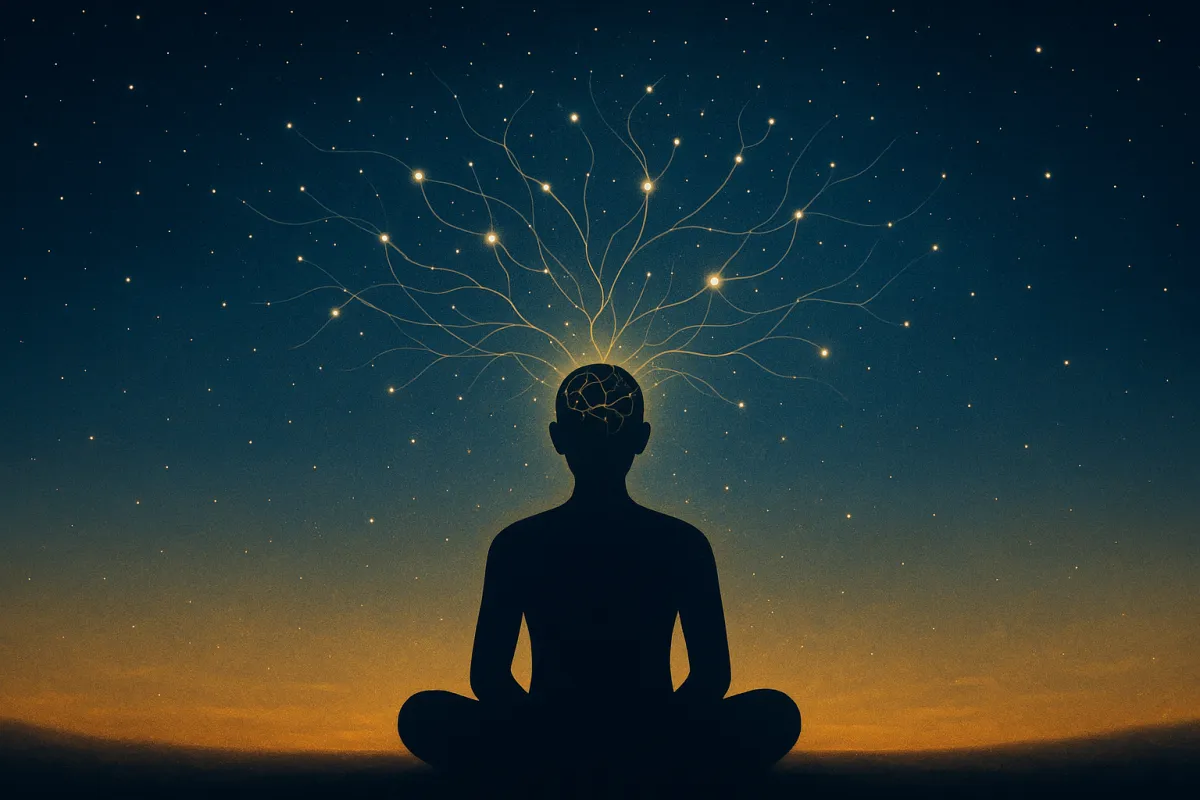
You're Using Your Intelligence Wrong (And It's Why You Feel Empty)
"The highest function of intelligence is to transcend purely analytical thinking."
You're successful. You've mastered complex problems, built businesses, and solved challenges that would break most people's brains.
So why do you feel like something essential is missing?
Ancient yoga philosophy has an answer that might surprise you: You've been using your intellect for the wrong purpose.
The Two Functions of Intelligence
Most successful people have developed what yogic texts call sharp "discrimination"—the ability to analyze, strategize, and make decisions that create material results.
But there's a completely different function of intelligence you've probably never been taught.
Ancient texts describe this as Vijnanamaya Kosha—the wisdom body that uses intellect "not for worldly gains but for spiritual inquiry and the pursuit of ultimate truth."
Think about it: When was the last time you applied your analytical skills to questions like:
What am I actually seeking underneath all this achievement?
What's the difference between what seems important and what actually matters?
How do I know when I'm chasing something real versus something temporary?
Why Smart People Feel Empty
Here's the problem: You've trained your mind to be brilliant at external analysis but terrible at internal discernment.
You can spot a bad business deal from miles away, but you can't tell the difference between what will actually bring fulfillment and what just looks impressive.
You can analyze market trends, but you've never learned to examine the unexamined assumptions driving your life.
This creates a specific type of suffering: Having everything you thought you wanted while feeling like you're missing everything that actually matters.
The Information vs. Wisdom Gap
Most people—especially high achievers—confuse information with wisdom. They think that accumulating more knowledge, more skills, more strategies will eventually lead to fulfillment.
It doesn't work that way.
As ancient teachings explain: "True wisdom involves the integration of knowledge with one's being, leading to a transformation of consciousness."
Information stays in your head. Wisdom transforms who you are.
You might know that relationships matter more than money. But if you're still working 80-hour weeks and wondering why you feel disconnected, that knowledge hasn't integrated with your being.
Beyond Rational Thinking
Here's where it gets interesting: The highest function of intelligence is to transcend purely analytical thinking.
Some truths can't be reasoned your way to. Some insights only come through what yogic traditions call "direct knowing"—a type of understanding that bypasses the constant mental commentary.
You've probably experienced this: moments when you just knew something was right or wrong, beyond logic. When you felt a deep sense of truth that didn't come from thinking through pros and cons.
That's your wisdom intelligence working.
Most successful people have learned to distrust this type of knowing in favor of spreadsheets and data analysis. But the ancient wisdom says both types of intelligence are essential.
The Bridge to Your True Nature
The wisdom body serves as what texts describe as "the bridge between the mind's processing of everyday experiences and the blissful realization of one's true nature."
Translation: There's a part of you that can step back from the constant mental activity and experience deeper peace—not as an escape from life, but as the foundation for living more authentically.
This isn't about becoming less sharp or analytical. It's about adding a dimension of intelligence you've been missing.
Discernment: The Skill You Need Most
The core practice of the wisdom body is developing viveka—discrimination between what's real and unreal, eternal and temporary.
For successful people, this might look like:
Distinguishing between achievement that feeds your ego versus growth that serves your authentic purpose
Recognizing when you're chasing status symbols versus pursuing genuine fulfillment
Understanding the difference between being busy and being productive
Discerning which opportunities align with your deeper values versus what just sounds impressive
The Questions That Change Everything
Instead of always asking "How do I get more?" or "How do I optimize this?" start applying your intelligence to deeper questions:
What am I actually seeking underneath this desire for success?
When I strip away external validation, what genuinely matters to me?
How do I know the difference between my authentic voice and social conditioning?
What would I pursue if no one else would ever know about it?
These aren't philosophical luxuries. They're the most practical questions you can ask if you want to build a life that actually satisfies your deeper intelligence.
Integration, Not Information
The goal isn't to accumulate more spiritual knowledge. It's to integrate whatever wisdom you discover with how you actually live.
This means using your analytical skills not just for external problems, but for examining your own patterns, motivations, and assumptions.
It means developing the type of discernment that can tell the difference between what you think you should want and what you actually need for fulfillment.
Your Next Level of Intelligence
You've already proven you can master complex external challenges. The next frontier is developing the internal discernment that creates lasting satisfaction.
This isn't about becoming less successful in the conventional sense. It's about becoming successful at the things that actually matter while maintaining your edge in everything else.
Ready to develop the wisdom dimension of your intelligence? Join our practices in the Yoga Mārga Skool community, where we explore how to apply your analytical brilliance to the deeper questions that create lasting fulfillment. Because the same intelligence that built your external success can unlock your internal freedom—if you know how to use it.
Your intellect is your greatest asset. It's time to learn its highest function.